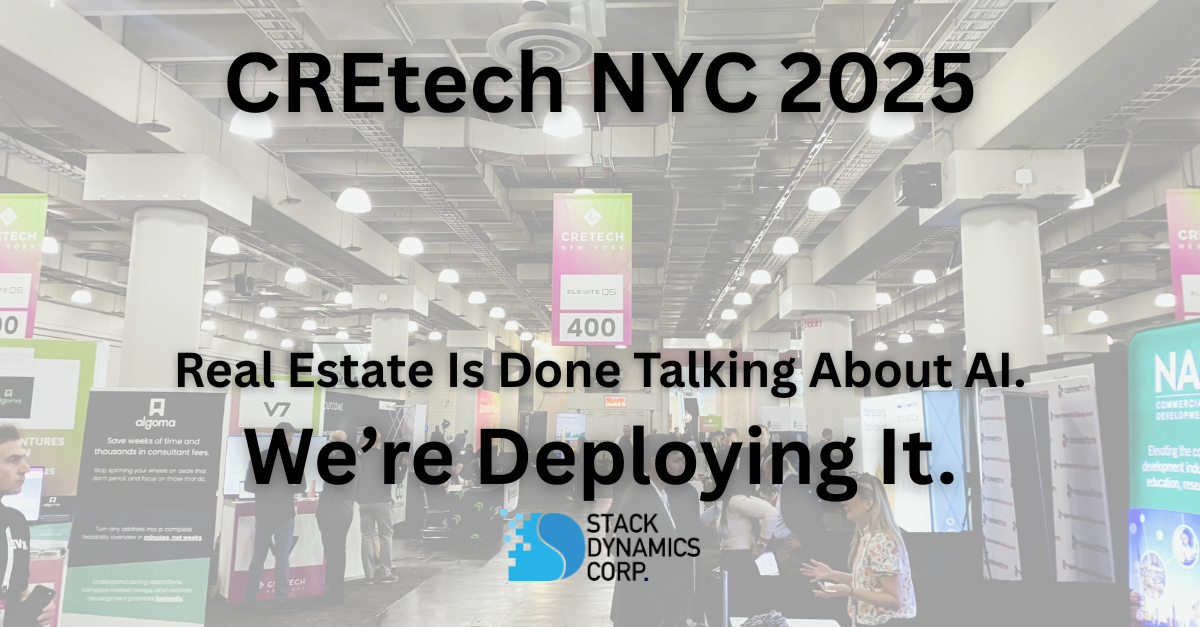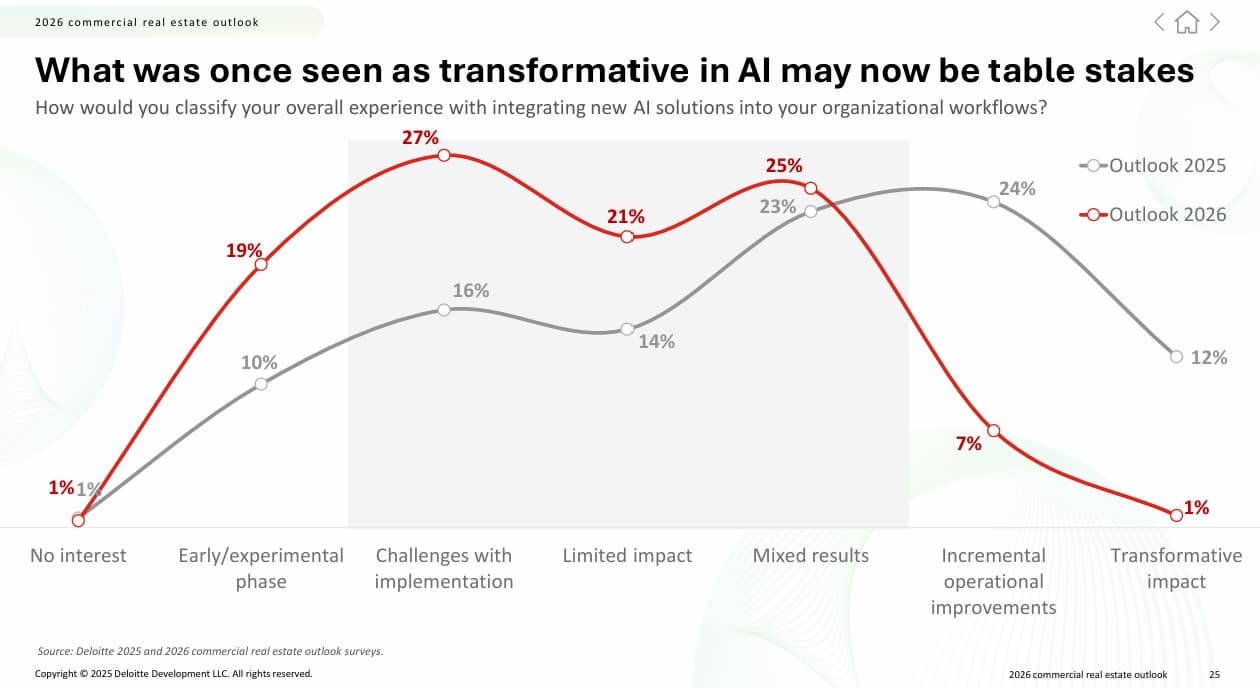The energy at CREtech NYC 2025 was different this year. After two days at the Javits Center, surrounded by nearly 3,000 real estate professionals and over 1,000 solution providers, one thing became abundantly clear: the commercial real estate industry has crossed a threshold. The conversation has shifted from “What can AI do?” to “How do we implement AI today?”
The Conference Landscape
CREtech NYC returned as the flagship event of NYC Real Estate Tech Week, bringing together an impressive roster of industry leaders, from CEOs of major REITs to heads of corporate real estate at Fortune 500 companies. The conference introduced a new Hosted Meetings Program this year, facilitating over 1,500 pre-scheduled one-on-one meetings between solution providers and qualified buyers—a format that underscored the industry’s demand for actionable connections over theoretical discussions.
For StackDC, these two days were packed with productive meetings with prospective clients and exploratory conversations with venture capitalists active in the proptech space. What we heard consistently validated our core thesis: the market is hungry for practical AI solutions that integrate with existing workflows and deliver measurable ROI.
Key Themes: The Industry’s New Priorities
1. Stop Getting “AI-Ready” and Become AI-Active Today
One of the most compelling sessions bore this exact title, and it captured the prevailing sentiment across the conference. The era of preparation is over. Companies are no longer asking if they should adopt AI. Some 90% of commercial real estate firms plan to integrate AI into their operations, according to research from JLL highlighted at the event.
The question now is how to deploy AI in ways that solve immediate problems. Attendees weren’t interested in five-year roadmaps or transformational visions. They wanted to know: What can I implement next quarter? What will save my team time next month? What will improve our margins this year?
2. Practical Applications Across the Real Estate Value Chain
Throughout our meetings and the conference sessions, we saw companies exploring tangible AI applications across every segment of the real estate value chain:
Property Management & Operations: AI agents handling tenant maintenance requests, optimizing building operations through predictive maintenance, and managing energy consumption in real-time.
Leasing & Marketing: Automated lead nurturing, AI-powered tour scheduling, and the generation of bespoke marketing materials tailored to specific stakeholders, all at scale.
Investment & Analytics: AI-driven market forecasting, risk assessment tools, and automated underwriting that reclaims hours of analyst time for higher-value strategic work.
Design & Construction: Generative design tools, project management automation, and cost optimization platforms transforming the AEC sector.
The common thread? These aren’t moonshot projects. They’re practical tools addressing specific inefficiencies that real estate professionals face every day.
3. Workflow Integration is Non-Negotiable
Perhaps the most important insight from our conversations: solutions that require companies to abandon their existing systems face insurmountable adoption barriers. The most successful AI tools function as “digital coworkers”—they enhance current workflows rather than replace them.
Multiple sessions emphasized the challenge of data silos and the critical need for unified platforms that aggregate data streams to provide smart, actionable insights. The message to proptech companies was clear: if your solution doesn’t integrate seamlessly, it won’t get adopted, regardless of how powerful it is.
This resonated deeply with our approach at StackDC. Our AI-enabled workflow automation is designed specifically to fit into how real estate professionals already work, particularly within the back-office operations that are often overlooked but critically important.
4. ROI Over Hype
The industry has matured beyond buzzwords. Every conversation eventually came back to return on investment. Decision-makers want to see clear metrics: How much time does this save? How much does this reduce operational costs? How quickly will we see results?
The shift from “growth at all costs” to strategic, ROI-focused technology investment was palpable. Companies are willing to invest in AI, but they’re demanding proof of value, and they’re demanding it quickly.
The Agentic Future
A fascinating emerging concept discussed throughout the conference was “agentic AI,” or AI systems that can act autonomously as digital team members. Rather than tools that require constant human direction, agentic AI can handle complete workflows: responding to tenant inquiries 24/7, managing maintenance workflows from request to completion, or nurturing sales leads through the entire funnel.
This represents the next evolution of proptech: moving from automation of individual tasks to autonomous management of entire processes. For companies struggling with staffing challenges and operational inefficiencies, this vision is particularly compelling.
What Resonated: StackDC’s Message in the Market
Our meetings with prospective clients and VCs reinforced that StackDC’s positioning hits the market at exactly the right moment. Our message—practical AI solutions that integrate with existing workflows and generate quick ROI—resonated consistently because it addresses the industry’s current pain points:
- Practical, not theoretical: We’re solving real back-office inefficiencies today, not promising transformation tomorrow.
- Integration-first: Our solutions work within existing systems, reducing friction and accelerating adoption.
- Quick ROI: We focus on automating redundant tasks that immediately reclaim time and reduce costs.
- Real estate-specific: We understand the unique workflows and challenges of the CRE industry.
The conversations we had weren’t about convincing people that AI matters—they already know that. They were about demonstrating that our approach to AI implementation aligns with how real estate companies actually operate.
Conclusions: The Market is Ready
Walking away from CREtech NYC 2025, several conclusions are inescapable:
The window is open: With 90% of firms planning to adopt AI, the market opportunity for practical proptech solutions is massive. And it’s happening now, not in some distant future.
Practicality wins: The companies that will succeed in this market are those that solve specific problems with measurable results. The era of “disruptive” solutions that require complete operational overhauls is over. The era of practical tools that make existing workflows smarter has arrived.
Integration is everything: The most significant barrier to adoption often isn’t cost or capability, it’s friction. Solutions that integrate seamlessly will capture market share; those that don’t will struggle regardless of their technical sophistication.
The industry is sophisticated: Real estate professionals understand AI’s potential and its limitations. They’re not looking for magic; they’re looking for tools that work. They want partners who understand their business, not technologists who want to reinvent it.
For StackDC, CREtech NYC 2025 validated our strategy and energized our team. The meetings we held, the conversations we had, and the interest we generated all point to one conclusion: the market is ready for what we’ve built.
The future of proptech isn’t about replacing how real estate professionals work. It’s about making them more efficient, more effective, and more competitive. And that future is being built today.





